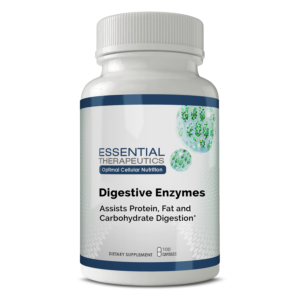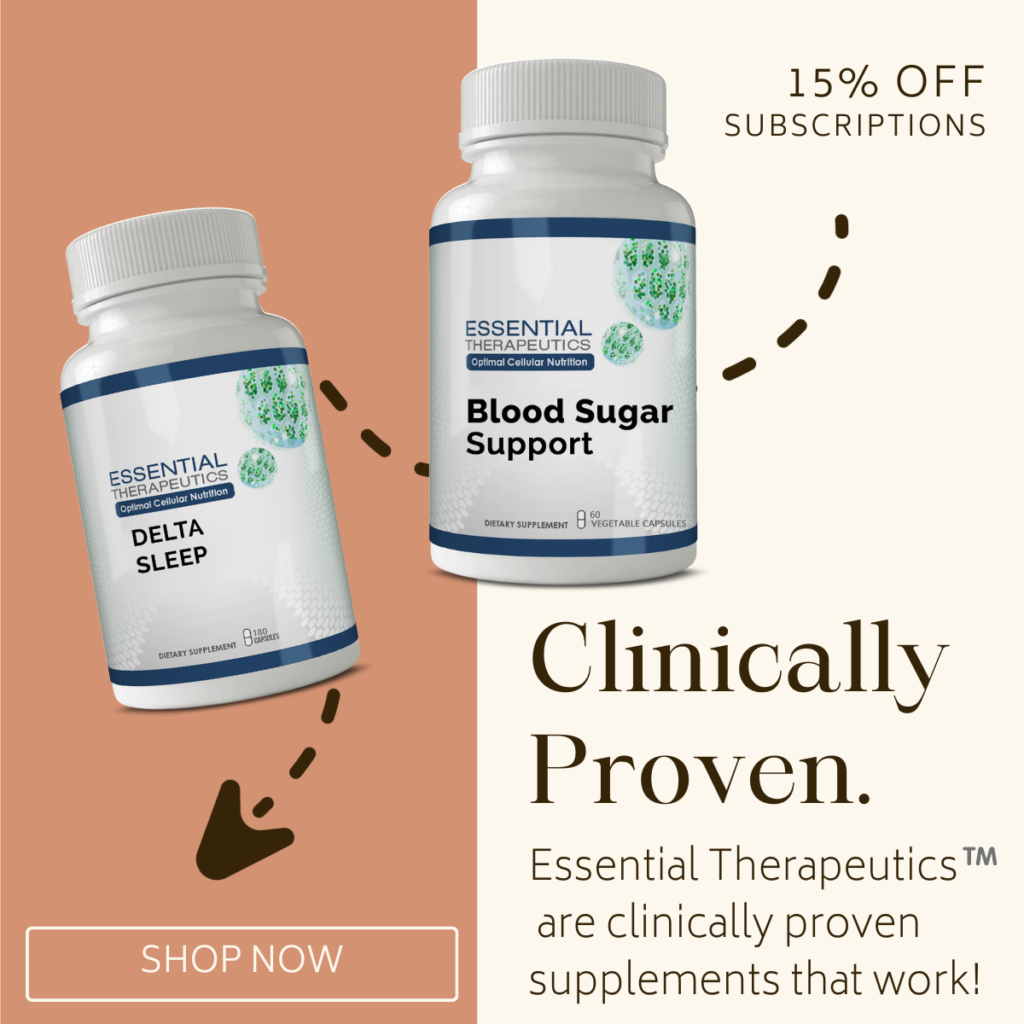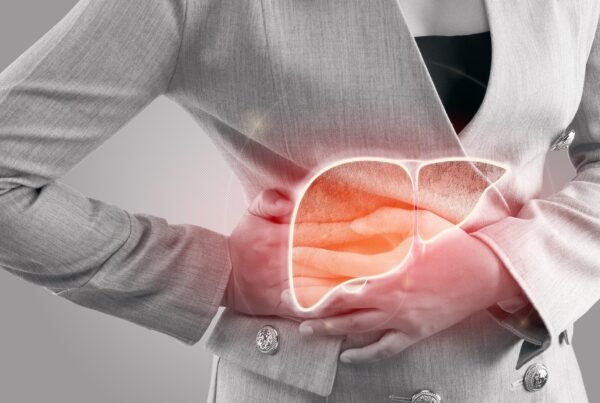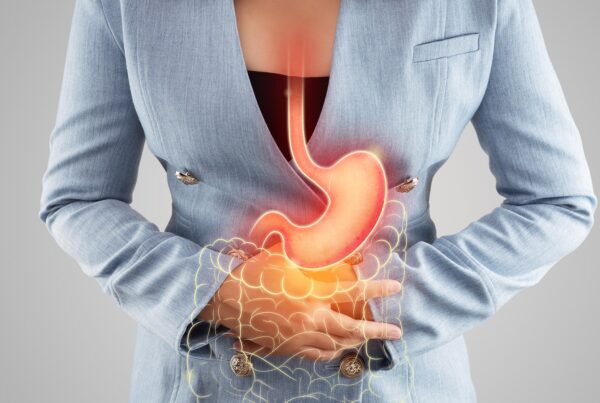Which Diet Is Right For You? – Part One
We all know that our diet is crucial to maintaining good health, fitness, and overall wellbeing, but which diet is the best for you? There are a number of diets out there, with verifiable health benefits, so how do you choose the one that’s best suited to your needs?
In this and additional blogs we’ll take a look at some of the most popular and beneficial diets out there, and see how they compare against one another.
Plant-Based/Whole Foods Diets/Whole Foods 30 Diet
Plant-Based Diets
While it is popular and widely advocated for its numerous health benefits, the term plant-based diet can be quite ambiguous. The plant-based diet is an umbrella term used to describe diets that are predominantly based on foods sourced from plants.
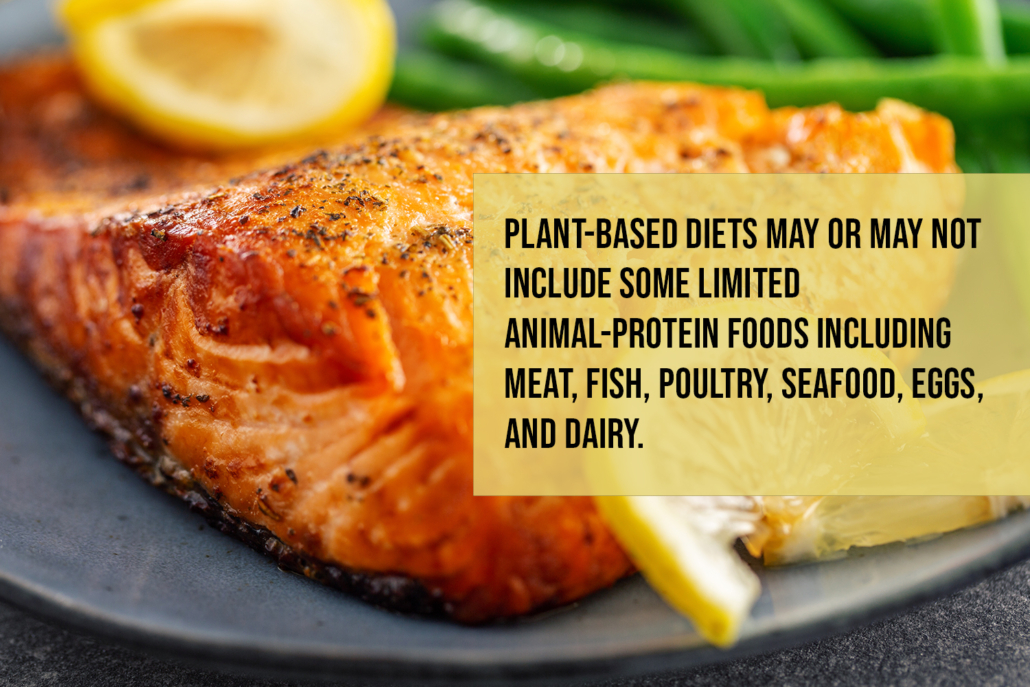
A vegan diet excludes all animal-derived products, whereas a vegetarian diet is more diverse and includes animal-produced foods in varying degrees
The lacto-ovo vegetarian does not eat the flesh of animals, but does eat both eggs and dairy such as milk and cheese from cows or goats. The ovo-vegetarian eats eggs but not meat. The lacto-vegetarian is similar to the lacto-ovo-vegetarian, but excludes eggs from his diet. A vegan not only excludes meat, but also all dairy products, eggs and foods which contain any product from animals, even gelatin. Pescatarians eat eggs and fish, but no beef, pork or poultry, while a semi-vegetarian generally follows a vegetarian lifestyle, but occasionally eats animal flesh.
A whole-foods, plant-based diet (WFPB diet) involves the consumption of mainly plant-based whole foods like fruits, vegetables, legumes, whole grains, nuts, and seeds, with little to no consumption of animal foods. It encourages raw foods, and limits processed or refined foods like refined (white) flour, added sugar, additives, and processed oils.
It can be confusing but a “whole foods diet” isn’t the “Whole Foods 30 Diet Plan,” which I’ll cover later in this blog.
The whole-foods, plant-based diet encourages us to be mindful of our eating habits, focusing on the quality of the food, and promotes locally produced food, preferably organic.
The basic principles of a whole-foods, plant-based diet are as follows:
- Emphasizes whole, minimally processed and ideally locally sourced foods.
- Severely limit or avoid all animal products.
- Focuses on plants, including vegetables, fruits, whole grains, legumes, seeds and nuts.
- Excludes refined foods, like added sugars, additives, white flour and processed oils.
Plant-based diets provide significant health benefits, some of which are listed below:
- Weight Management
Studies have shown that following a plant-based diet, especially the whole-foods, plant-based diet (WFPB diet), results in lower body mass index (BMI), and reduces the rate of obesity, diabetes, and heart disease, as compared to a primarily meat-based diet.
Plant-based foods are rich in fiber and contain complex carbohydrates, and the high water content in raw fruits and vegetables can help us stay satiated for longer durations and increases the energy used while resting, leading to better metabolism. Moreover, the exclusion of processed foods in the WFPB diet further helps in losing weight.
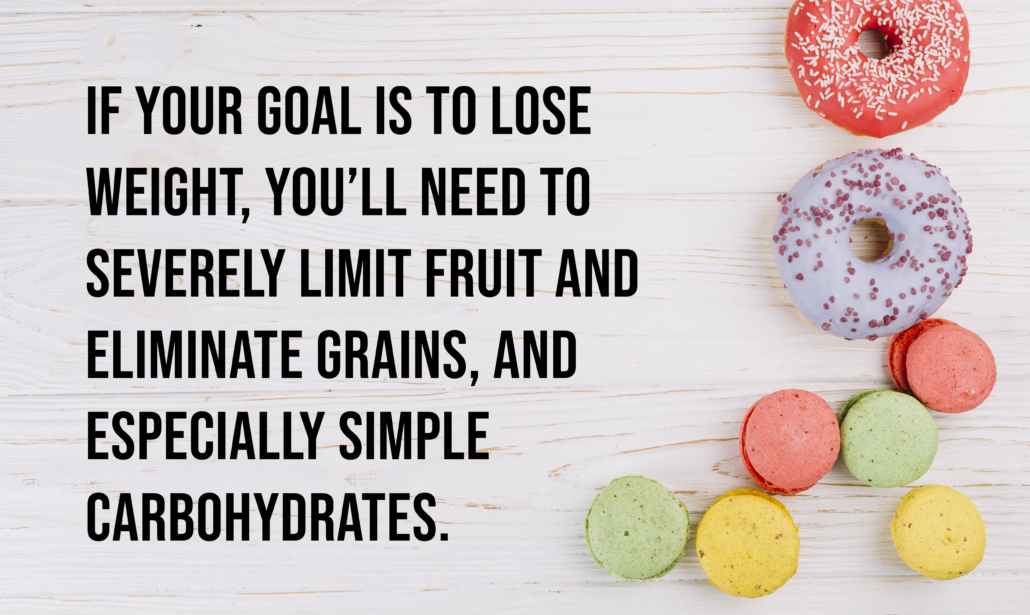
Foods with Simple Carbohydrates
- Baked goods (including bread) made with white flour
- Cake
- Candy
- Candy bar
- Carbonated drink
- Chocolate
- Cookie
- Corn syrup
- Fruit juice
- Fruit preserve or jam
- Fudge
- Honey
- 2% or regular milk
- Most packaged cereals
- Pasta made with white flour
- Table sugar
- Full fat yogurt
- Cardiac Health
It has been reported that a plant-based diet could decrease the risk of developing cardiac disorders by 16 percent, while reducing the chances of death due to cardiac diseases by 31 to 32 percent.
Moreover, eating less meat and more plant foods also reduces blood pressure and cholesterol levels, and reduces the risk of stroke, certain types of cancers, type 2 diabetes, and obesity, which leads to better cardiac health and overall good health.
It’s worth pointing out that future blogs will reveal that low carb diets may also reduce the risk of heart disease, stroke, type 2 diabetes, and heart attack.
The advantage of the plant-based diet comes from limiting processed foods and eating “whole foods.”
- Prevention and Management of Diabetes
Studies have shown that a plant-based diet is effective in preventing the onset of type 2-diabetes. A plant-based diet containing high-quality plant foods can significantly decrease the risk of developing type 2-diabetes.
Another study compared the preventative effects of various vegetarian diets with non-vegetarian diets, against type 2 diabetes, and it was seen that the prevalence of type 2 diabetes in people consuming a vegan diet was just 2.9%, as compared to the 7.6% of those on a non-vegetarian diet.
Another study also suggested that adopting vegetarian and vegan diets could help diabetics reduce their dependence on medicines, manage weight, and improve other metabolic markers, leading to better diabetes care.
Apart from the health benefits mentioned above, a plant-based diet is also known to promote longevity and reduces the risk of developing certain cancers (gastrointestinal and colorectal cancer).
Eliminating or reducing simple sugars is the key for reversing type 2 diabetes. Those with type 2 diabetes should also limit their fruit intake to no more than one or two fruits a day.
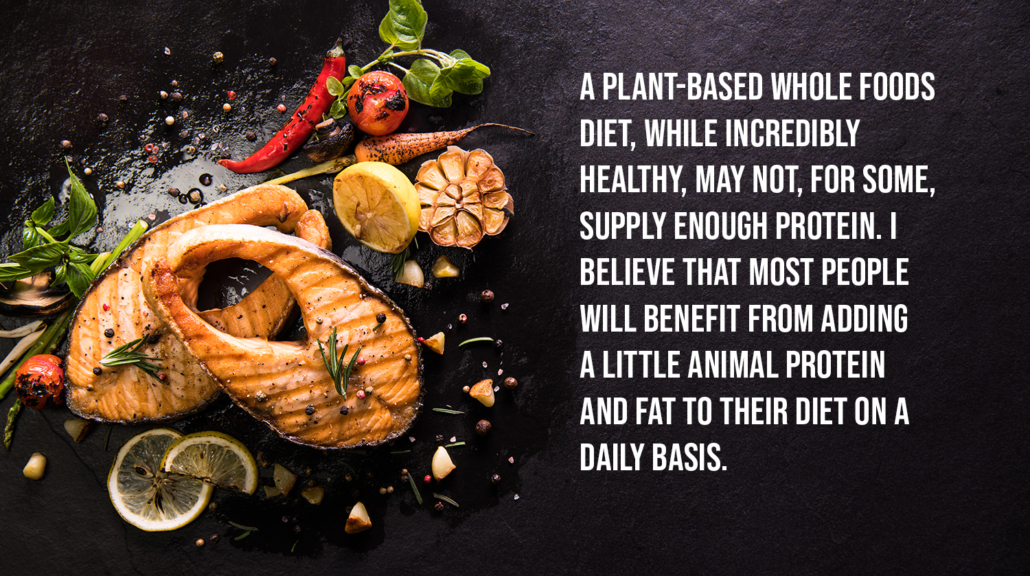
In My Experience
It can be a real challenge to get enough complete protein and healthy fats on a purely plant based whole foods diet. Avocados, nuts and seeds, included in a plant based vegetarian diet help provide needed protein and fats. However, I find this diet while healthy, is difficult to stay on long term. It is a lifestyle diet after all.
I believe adding a modest amount of animal protein one meal a day or every other day offers the health benefits of plant foods while ensuring you’re getting enough protein.
I advocate eating a little fruit (no more than 2 servings a day), lots of fresh vegetables (frozen veggies care fine and contain just as much nutritional value as fresh), and lentils, beans, and nuts on a daily basis. And adding animal protein two or three times a week, if acceptable, helps ensure adequate protein, iron, vitamin B12, and essential fatty acids.
To be sure you’re getting enough protein and nutrients keep the following tips in mind.
- Diets that don’t include fish or eggs are generally low in eicosapentaenoic acid (EPA) and docosahexaenoic acid (DHA). These essential fatty acids are vital to your heart, eye, and brain health. Essential fatty acids are as then name implies essential for good health. The body can’t make these fats they must come from our diet. Eating algae or taking algae supplements can help make up for this deficiency.
- Lack of protein can cause a zinc deficiency. Zinc is needed for a healthy immune response. Nuts, legumes, whole grains, and cheeses can help boost your zinc.
- Vegetarians need almost twice as much iron as non-vegetarians. Iron deficiencies can cause symptoms such as fatigue, weakness, headache, and a weakened immune system, among others.
Sprouted or fermented beans, grains, and seeds can help improve your iron intake.
- Lacto-ovo vegetarians usually get enough B-12, but lacto vegetarians and vegans who avoid dairy, may not get enough B-12 in their diets. I recommend adding a good multivitamin with methylated B12 and or a sublingual methylated B12 supplement.
B-12 deficiency can cause symptoms such as diarrhea or constipation, fatigue, shortness of breath, and loss of appetite, among others.
- Vegans are at high risk of a vitamin D and calcium deficiency. Add a vitamin D3 supplement (4,000-5,000 i.u.’s a day) and make sure your multivitamin has a daily dose of at least 500mg of calcium.
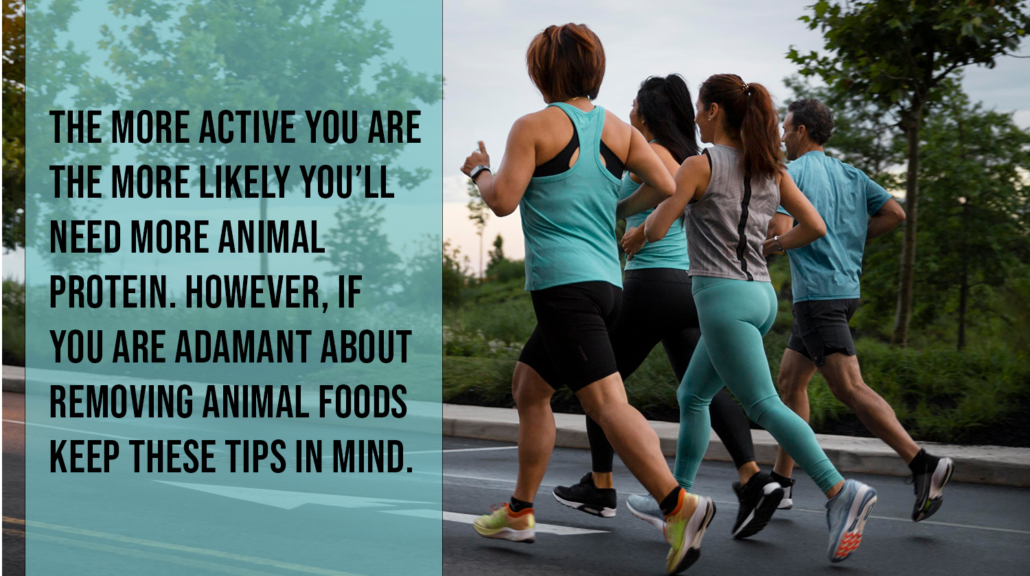
Good plant protein sources include:
- Cooked lima beans, which have 11.6 g per cup (170 g)
- Green peas, which have 7.9 g of protein per cup (145 g)
- Kale, which has 0.7 g of protein per cup (16 g)
- Other rich sources of vegetable protein include broccoli and broccoli raab, cooked mushrooms, yellow corn, and green leafy vegetables like spinach and collard greens.
- Lentils, and peas are low in calories but dense with protein.
- The best seeds for protein are pumpkin, hemp, chia, sunflower, and sesame seeds.
- Look for nuts like almonds, cashews, pecans, pistachios, and walnuts.
- You can also use a variety of nut milks, such as almond milk and cashew milk, to help boost your protein intake.
- Walnuts are one of the best plant-based sources of omega-3 fatty acids and loaded with antioxidants.
- Flaxseeds are a good source of omega-3 and can be added to shakes and salads.
- Pumpkin seeds seeds are a good source of protein, iron, zinc, magnesium, calcium, folate, beta-carotene, omega-3 and omega-6 fatty acids.
The Whole Foods 30 Diet
The Whole Foods 30 Diet is basically an elimination diet where you eliminate potentially toxic foods. For 30 days you’re encouraged to eat “whole foods.”
Since 2009, the 30-day diet—which cuts out alcohol, sugar, legumes, grains, dairy, and all processed foods—has helped followers lose weight, up their energy levels, and identify the problem foods that are causing unwanted symptoms.
For 30 full days, you avoid the following foods:
Alcohol: No beer, wine, or liquor, not even for cooking.
Added sugar: Exclude added sugar and artificial sweeteners of any kind, including popular sugar substitutes like honey, agave, maple syrup, and Stevia.
Dairy: No milk products from any animals including cow, goat, and sheep. This includes cheese, cream, and butter.
Grains: Every kind of grain is out, even if it’s gluten-free. This includes oats, wheat, rice, corn, quinoa, buckwheat, rye, barley, and more. Note that ingredients made from grains also count, like germ, starch, and bran.
Legumes: No beans or peas of any kind including soybeans and soy products like tofu, soy sauce, and miso. No peanuts or peanut butter, either.
MSG, Sulfites, or Carrageenan: Be sure to read all food labels carefully and avoid preservatives and highly manufactured ingredients.
Packaged Foods: Foods that may technically comply with Whole30, but are clearly unhealthy such as baked goods, chips, and French fries should be excluded from your diet.
What You Can Eat
Vegetables: All veggies, including carb-rich potatoes, are allowed during Whole30. A healthy mix of different vegetables both cooked and raw is recommended. Sugar snap peas, green beans, and snow peas are allowed.
Meat and Poultry: All meat, including beef and pork and poultry like chicken and turkey, are allowed. Watch out for processed meat like lunch meat and sausage, since they can sometimes have added ingredients like sugar.
Fish: Fresh and canned fish, including salmon and tuna, are perfectly fine to eat while on the diet.
Eggs: Protein-rich eggs are a Whole30 friendly food.
Fruit: Since added sugar is not allowed, fruit can help curb sweet cravings. However, moderation is essential. Unsweetened fruit juice is also allowed in small amounts.
Nuts: All nuts and seeds are allowed with the exception of peanuts. If you plan to consume nut butters or nut milks, carefully check the labels to avoid added sugars and preservatives.
Fats, Oil, and Vinegar: Extra-virgin olive oil, coconut oil, and even animal fat like lard and schmaltz are okay. Ghee is also Whole30 compliant—making it the only dairy allowed. Vinegar, as long it isn’t malt vinegar, are also good to go.
Salt: Whenever possible, use non-iodized salt.
Coffee and Tea: Coffee and tea, especially green tea, are allowed on Whole30, but in moderation. Just don’t use any sweeteners or dairy.
My Experience
I find this diet to be similar to what I recommend for my patients. I believe an elimination diet for 30 days followed by challenging foods you avoided during that time to be invaluable.
The diet isn’t sustainable long term, at least for most people. However, doing it for 30 days then trying to be mindful of avoiding or limiting the “bad foods” on a daily basis can yield some incredibly positive health results.
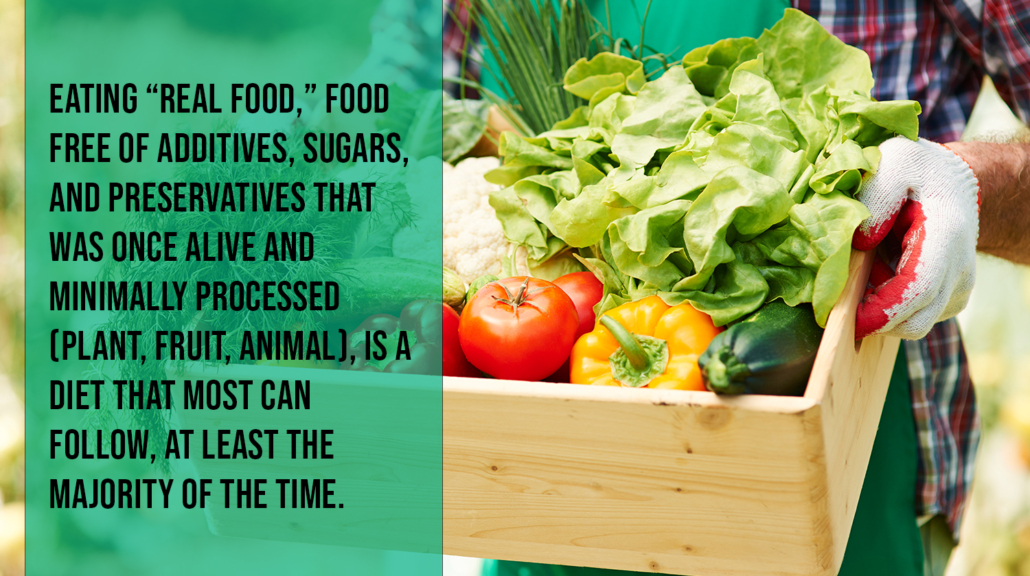
It doesn’t mean you can’t ever have a treat-you can but day-to-day stick to whole foods.
Dramatically reducing simple carbs, sugars, additives, pre-packaged foods is initially hard, and not always possible. However, reducing unhealthy food choices and replacing them with real whole foods will make a noticeable difference in your overall health.
Make sure you’re digesting you food and getting all the benefits from eating a healthy diet.
We’ve been told “you are what you eat.” And this is true! Healthy foods produce healthy cells. However, eating healthy foods does little good if you’re not digesting and absorbing the nutrients in those healthy foods. For those with malabsorption, reflux, heartburn, irritable bowel, and other gastrointestinal challenges, the benefits of a healthy diet are often lost.
Digesting, absorbing and utilizing the nutrients in our foods is just as important.
If you from gastrointestinal distress (ie. gas, bloating, heartburn, constipation, etc.), you’re not alone. More than 100 million Americans suffer digestive difficulties. Digestive enzymes can help.
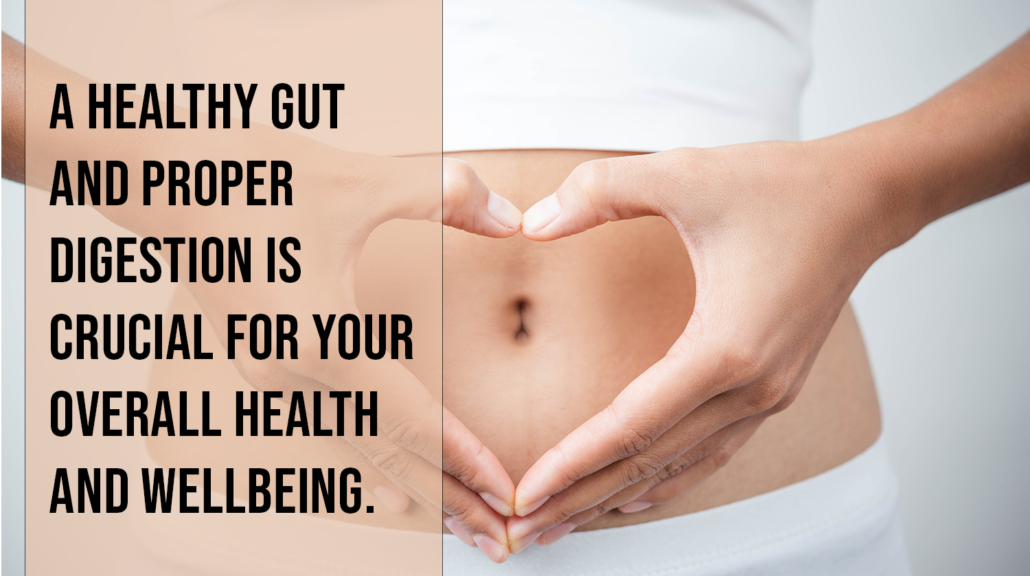
Diabetes, obesity, arthritis, depression, allergies, eczema, chronic fatigue and even autoimmune diseases can be linked to an unhealthy gut. When your gut is healthy, your immune system works well and when your immune system is functioning properly, the rest of your body’s systems can work well, too.
Processed foods and all their additives, preservatives, and nitrates do not contain the digestive enzymes needed for proper digestion and nutrient absorption causing an enzyme deficiency. And even if you eat plenty of good-for-you fruits and vegetables, if you cook them, their enzymes are destroyed. Your body is then forced to “borrow” enzymes from other parts of your body just to digest the food you’re consuming, again leading to overall deficiency.
Researchers now know that we lose digestive enzymes through sweat and body waste. As we age, the organs responsible for producing our digestive enzymes become less efficient.
In fact, studies show that, every ten years, your body’s production of enzymes decreases by 13 percent. So by age 40, your enzyme production could be 25 percent lower than it was when you were a child. By the time you’re 70, you could be producing a mere one-third of the enzymes you need.
To ensure you’re getting the nutrients you need for optimal cellular health I recommend eating a healthy diet and taking a digestive enzyme with each meal.
Essential Therapeutics Digestive Enzymes – 15% OFF in the month of August 2021 (discount code: AUG21DE)





